Herbs For Anxiety: 7 Natural Herbs You Need To Know 2024

Anxiety is a feeling of worry, nervousness, or uneasiness. It can be caused by stress and other factors such as work overload, family problems, or financial issues. In the modern era, anxiety has become a pervasive issue for individuals trying to keep pace with life’s fast-paced and demanding nature.
Are you someone who struggles with anxiety? If so, you’re not alone. Over 40 million adults[1] in the United States are estimated to suffer from an anxiety disorder. While prescription medication can be helpful, many people are now turning to more natural remedies for relief. Enter the world of herbs! These plants have been used for centuries to help calm the mind, reduce stress, and promote relaxation. Here, we will explore the top seven natural herbs for anxiety treatments. We will also see how they work and if there are any side effects to expect.
7 Natural Herbs For Anxiety
- Passionflower
- Ashwagandha
- Valerian Root
- Lemon Balm
- Ginkgo
- Rhodiola
- German Chamomile
How Do Herbs For Anxiety Work?
Herbs for anxiety work in general by interacting with various systems in the body to promote relaxation, reduce stress levels, and alleviate anxiety symptoms. The primary mechanisms through which natural remedies exert their effects include:
- Modulating neurotransmitters: Neurotransmitters are chemical messengers in the brain vital in regulating mood and anxiety levels. Some herbs influence neurotransmitters like serotonin, gamma-aminobutyric acid or GABA, and dopamine, which help improve mood and reduce feelings of anxiety.
- Reducing inflammation: Chronic inflammation has been linked to anxiety[2] and other mental health issues. Herbs with anti-inflammatory properties contribute to alleviating anxiety symptoms.
- Regulating stress hormones: The body produces stress hormones, such as cortisol, in response to stress and anxiety. Natural supplements for anxiety may help regulate cortisol production.
- Enhancing sleep quality: Poor sleep quality can exacerbate anxiety symptoms. Herbs can improve sleep quality, which may contribute to reduced anxiety levels.
Best Herbs For Anxiety
What herbs are good for anxiety? Several herbs are effective in reducing anxiety levels. Here are some of the best herbs for anxiety:
Passionflower
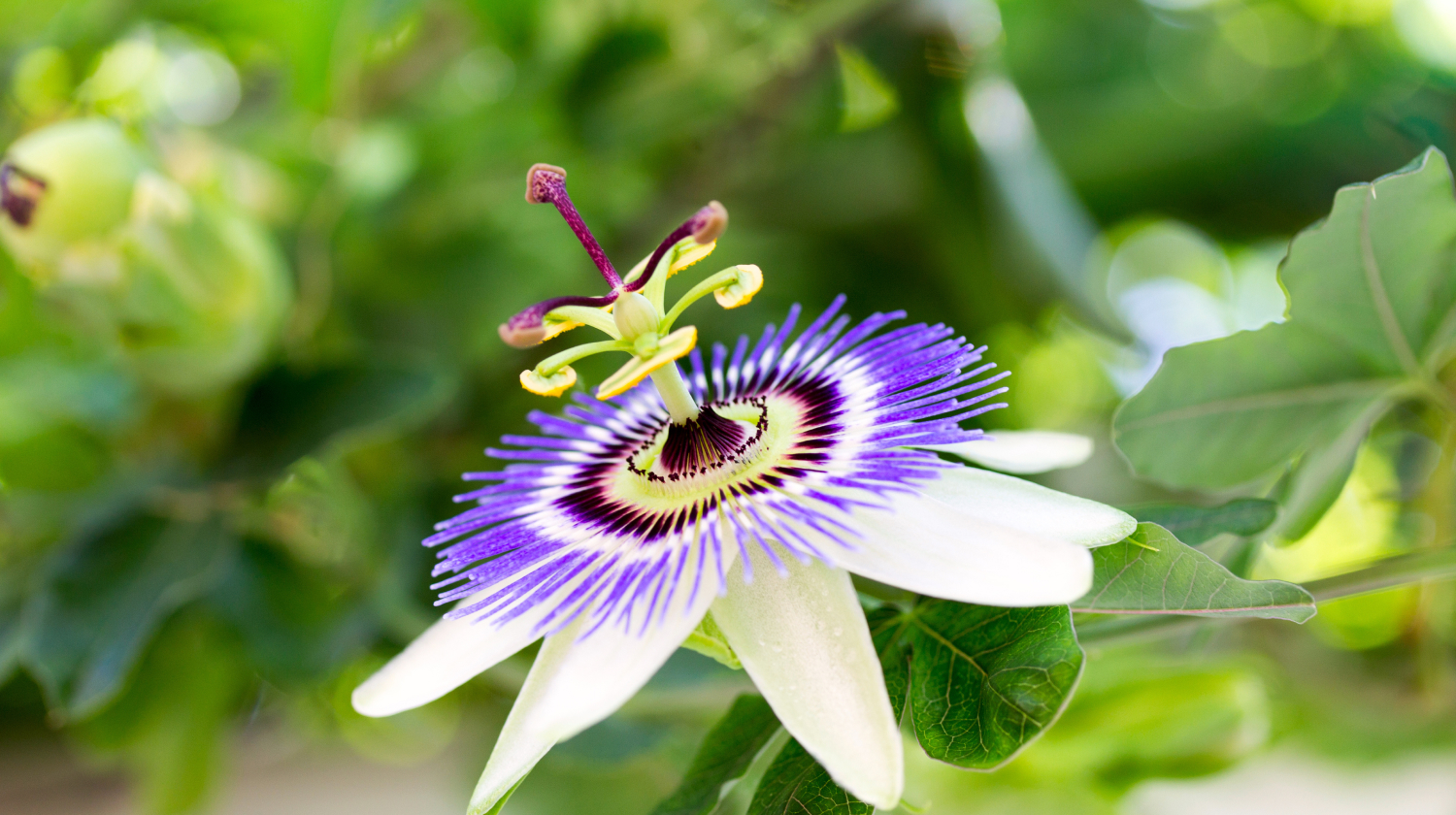
Passionflower is one of the most common natural herbs for anxiety. It is a herbal medication used for centuries as a natural remedy for anxiety, insomnia, and other nervous disorders. It works by increasing gamma-aminobutyric acid levels in the brain. GABA is a neurotransmitter that helps to reduce the activity of specific neurons, which can help to promote relaxation and reduce feelings of anxiety.
Passionflower also contains other compounds with a mild sedative effect, which can help reduce insomnia and promote restful sleep. Several clinical studies have been conducted on passionflower and their impact on anxiety. One study found that passionflower effectively reduced anxiety symptoms in neuropsychiatric patients.[3] Another study showed a considerable reduction in anxiety in patients undergoing dental extraction.[4]
Ashwagandha
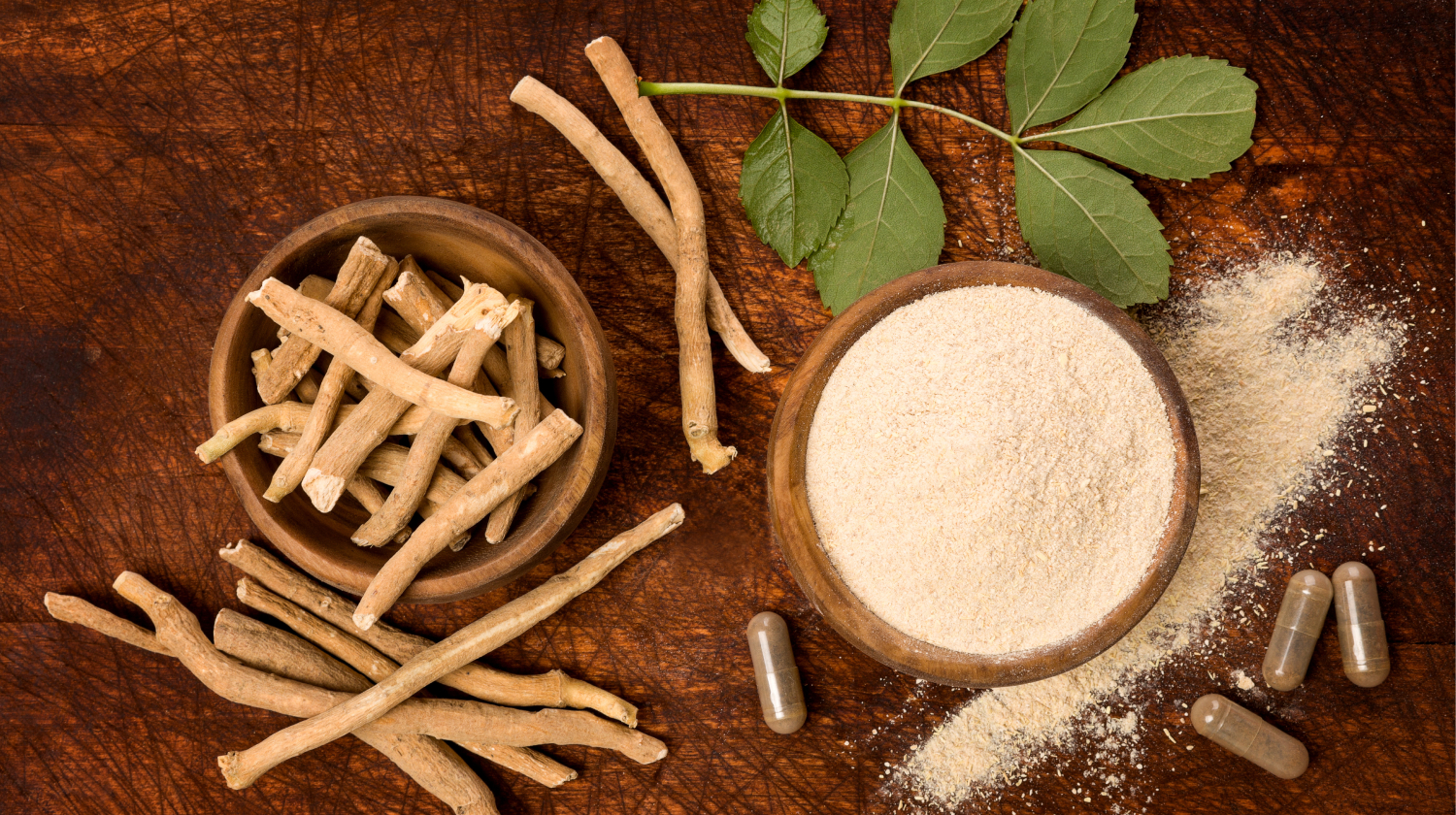
An herb commonly used in Ayurvedic medicine to help manage stress and anxiety is ashwagandha. It is classified as an adaptogen, which allows the body to adapt to stressors and restore balance. This means it is one of the best herbs for anxiety and sleep.
Ashwagandha regulates cortisol levels,[5] a stress hormone that can contribute to anxiety, depression, and other stress-related disorders. Research showed that ashwagandha extract was effective in reducing symptoms of anxiety and depression[6] in adults. However, more information[7] is needed because some studies do not agree with it.
Valerian Root

Valerian root is commonly used to treat anxiety because its compounds help calm the central nervous system. The root of the valerian plant contains compounds that have sedative and anxiolytic effects,[8] according to research. The study explored 39 participants’ reactions to using valerian root for a month. The results showed that the valerian root group had reduced anxiety, depression, and insomnia compared to the placebo group.
Lemon Balm
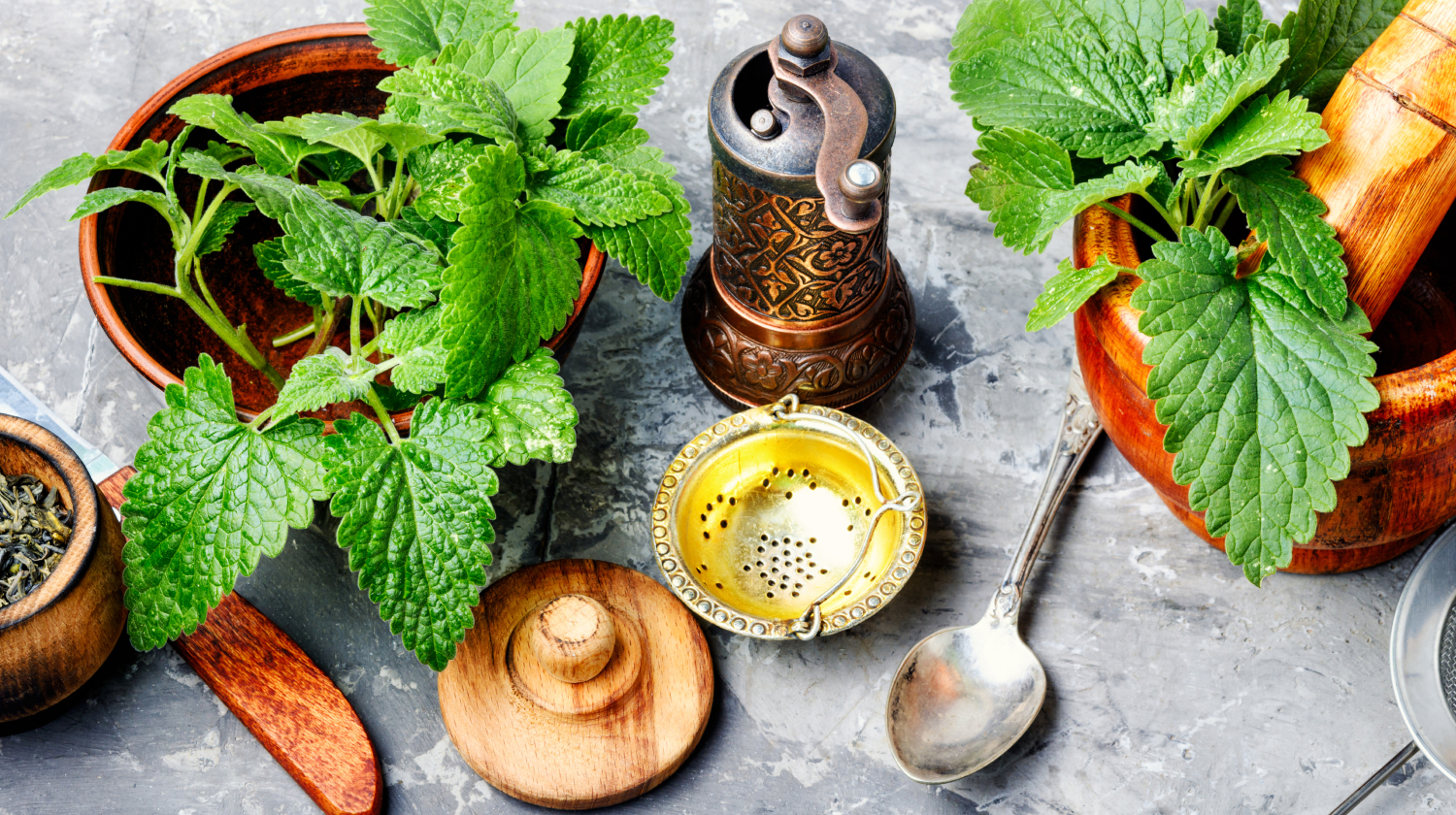
Lemon balm, or Melissa officinalis, is a natural herb used for anxiety and panic attacks. This herb helps with anxiety and promotes relaxation. Lemon balm is a mint family member with a lemony scent and flavor. It’s often used in teas, supplements, and essential oils.
Several studies have shown that lemon balm can positively affect anxiety and mood. For example, a study showed that lemon balm caused better sleeping patterns,[9] less depression, and less stress after eight weeks. Lemon Balm is one of the best herbs for anxiety and depression. Also, it is one of the most common natural remedies for anxiety in teenage girls.
Ginkgo
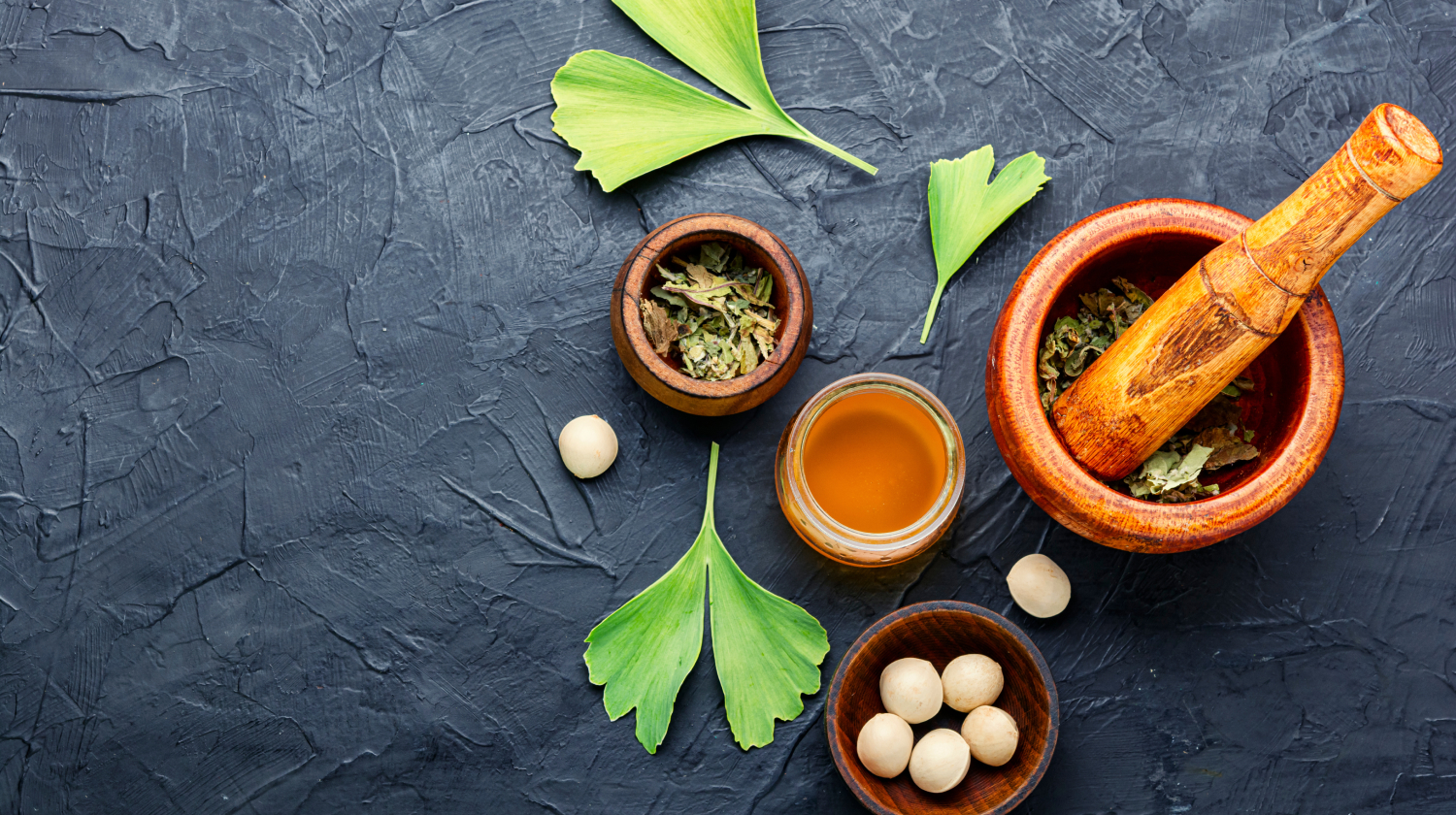
Ginkgo is one of the best herbs that help with anxiety. The tree is native to China and has existed for over 200 million years. Ginkgo biloba contains chemicals called ginkgolides and flavonoids that help improve circulation, which can benefit people with anxiety disorders who experience symptoms like numbness or tingling in their limbs.
Research also shows that the active components in ginkgo protect against damage caused by free radicals in the body. This is very helpful in the treatment of dementia[10] and other psychiatric disorders. Another study compared the effects of Ginkgo to venlafaxine, and Gingko showed better results in the long term for anxiety[11] in treating post-stroke depression.
Rhodiola
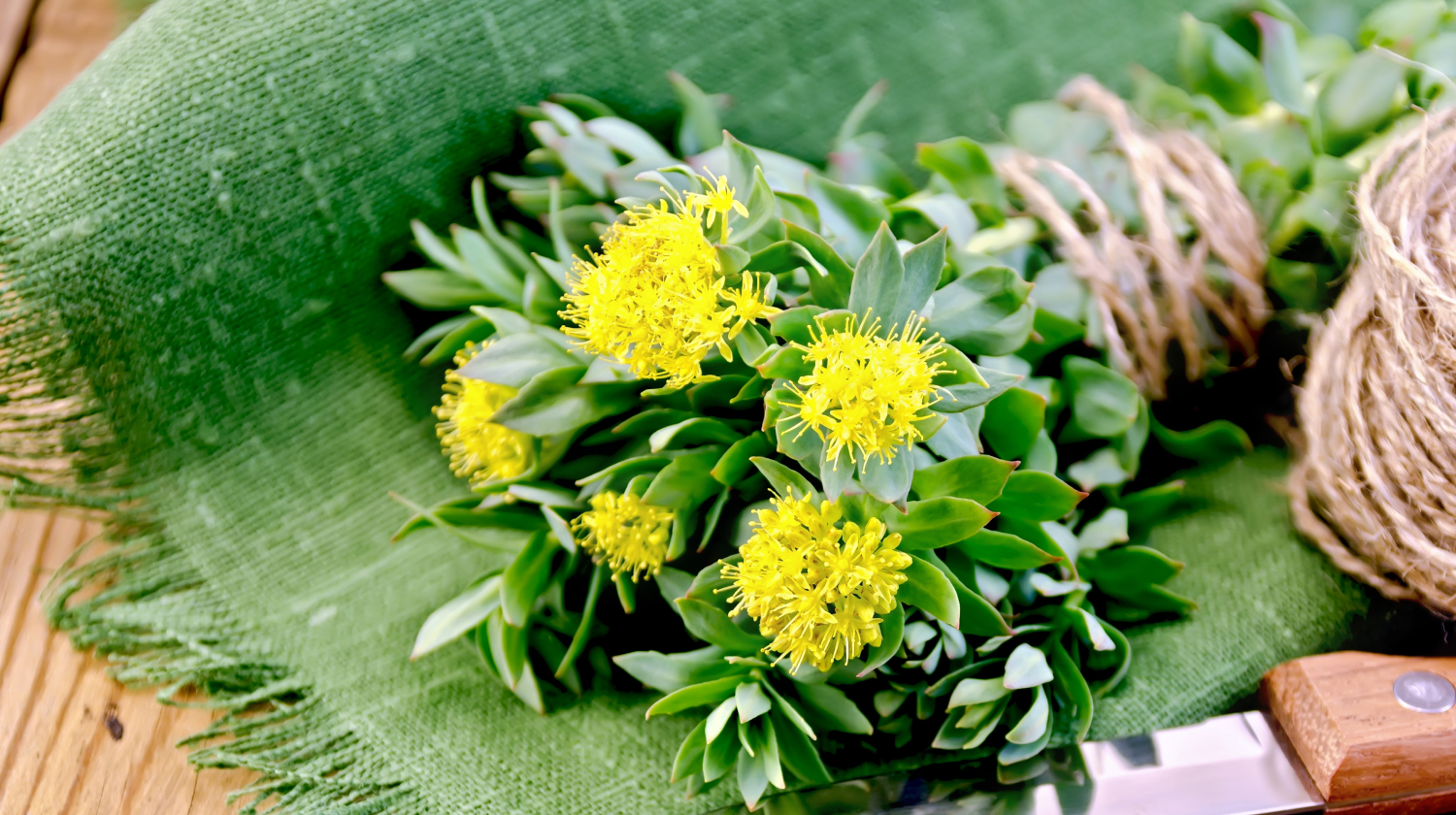
Rhodiola rosea[12] is another adaptogenic herb shown to help reduce symptoms of anxiety and depression, and it can also help improve mental performance and reduce fatigue. Research has shown that Rhodiola rosea may be effective in reducing symptoms of anxiety and depression.[13]
In addition to its potential benefits for anxiety and depression, Rhodiola rosea has also been shown to improve mental performance and reduce fatigue. For example, a recent study found that Rhodiola rosea balances cortisol levels and reduces patient stress.[13]
German Chamomile
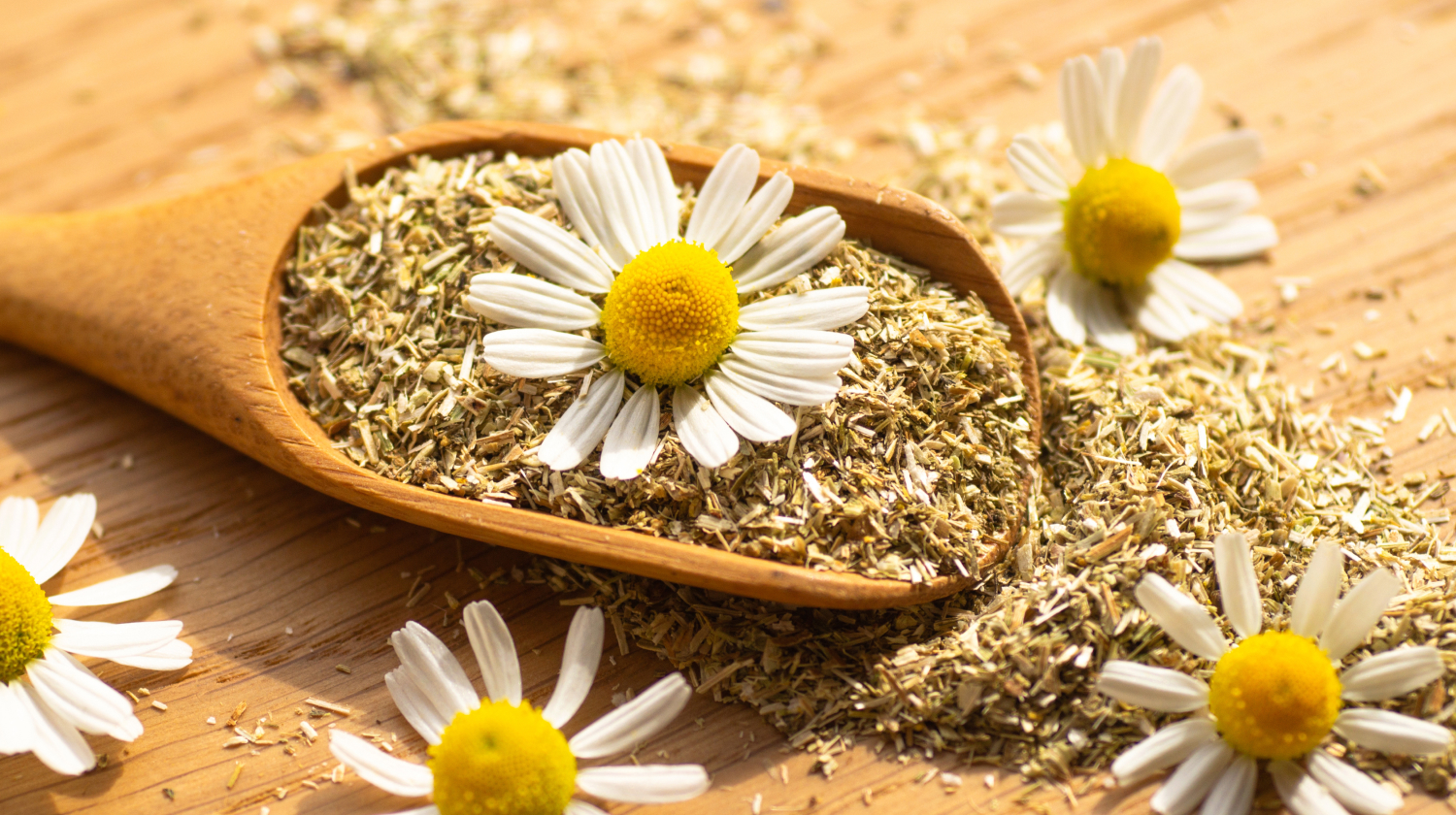
German Chamomile, also known as Matricaria chamomilla or Blue Chamomile, is a herb used for centuries as a natural remedy for various health conditions. The plant’s flower heads are used to make tea, essential oil, and other herbal preparations.
German Chamomile is most commonly used to treat anxiety,[14] insomnia, and digestive problems. One of the active compounds found in German Chamomile is apigenin, a flavonoid shown to have antioxidant, anti-inflammatory, and soothing properties. Research has found that apigenin can help reduce anxiety symptoms and promote relaxation,[15] making German Chamomile an effective natural remedy for anxiety.
How To Use Herbs For Anxiety
There are various ways to incorporate natural herbs into your diet. Here are some tips on how to use various herbs to help alleviate anxiety:
- Teas.
- Capsules and tablets.
- Tinctures and liquid extracts.
- Essential oils.
- Incorporate herbs into your diet.
Risks & Safety
While herbs can be a natural and effective way to manage anxiety, it’s essential to be aware of their potential risks and safety concerns. Here are some factors to consider:
- Allergies: Some people may be allergic to herbs such as chamomile.[16] If you experience any symptoms of an allergic reaction, such as hives, itching, or difficulty breathing, stop using the herb and seek professional help immediately.
- Interactions with medications: Some herbs can interact with prescription[17] or over-the-counter medicines, including blood thinners, sedatives, and antidepressants.
- Side effects: Some herbs, such as valerian root, can cause drowsiness, dizziness, or other side effects.[18] It’s essential to start with a low dosage and to monitor your reaction to the herb.
Other Natural Remedies For Anxiety And Depression
In addition to herbal remedies, several other natural approaches can help alleviate anxiety and depression. Here are some natural remedies for anxiety options:
- Exercise: Regular physical activity[19] has been shown to improve mood, reduce anxiety, and boost overall mental health. Aim for at least 30 minutes of moderate exercise most days of the week, incorporating activities you enjoy, such as walking, jogging, swimming, or yoga.
- Meditation and mindfulness: Practicing meditation or mindfulness techniques[20] can help reduce anxiety and depression by promoting relaxation and increasing self-awareness. Try dedicating 10-20 minutes daily to mindfulness practices like deep breathing exercises, progressive muscle relaxation, or guided imagery.
- Diet: A healthy diet rich in whole foods, fruits, vegetables, lean proteins, and healthy fats can help support mental health. Some research[21] suggests that these foods may positively affect mood and anxiety levels.
- Probiotics: Emerging research suggests that gut health may play a role in mental health, with some studies indicating that probiotics can help alleviate symptoms[22] of anxiety and depression. Include probiotic-rich foods, such as yogurt, kefir, and fermented vegetables, or consider a probiotic supplement.
- Sleep: Prioritizing sleep and establishing a regular sleep schedule[23] can significantly impact mental health. Aim for seven to nine hours of sleep each night and create a relaxing bedtime routine to help improve sleep quality.
- Social support: Connecting with friends, family, or support groups can help reduce feelings of isolation and improve overall mental health. Make an effort to maintain regular contact with your social support network and seek professional online therapy help if needed.
Final Thought
Incorporating these natural remedies can help support your mental health and overall well-being. Remember, it’s essential to consult with a healthcare provider before starting any new treatment for anxiety or depression, especially if you’re taking medication or have pre-existing health conditions.
+ 23 sources
Health Canal avoids using tertiary references. We have strict sourcing guidelines and rely on peer-reviewed studies, academic researches from medical associations and institutions. To ensure the accuracy of articles in Health Canal, you can read more about the editorial process here
- Nami.org. (2023). Anxiety Disorders | NAMI: National Alliance on Mental Illness. [online] Available at: https://nami.org/About-Mental-Illness/Mental-Health-Conditions/Anxiety-Disorders
- Renna, M.E., O’Toole, M.S., Spaeth, P.E., Lekander, M. and Mennin, D.S. (2018). The association between anxiety, traumatic stress, and obsessive-compulsive disorders and chronic inflammation: A systematic review and meta-analysis. Depression and Anxiety, [online] 35(11), pp.1081–1094. doi:https://doi.org/10.1002/da.22790.
- Katarzyna Janda-Milczarek, Karolina Wojtkowska, Jakubczyk, K. and Karolina Skonieczna-Żydecka (2020). Passiflora incarnata in Neuropsychiatric Disorders- A Systematic Review. [online] ResearchGate. Available at: https://www.researchgate.net/publication/347495207_Passiflora_incarnata_in_Neuropsychiatric_Disorders-_A_Systematic_Review
- Kaviani, N., Tavakoli, M., Tabanmehr, M. and Havaei, R. (2013). The efficacy of passiflora incarnata linnaeus in reducing dental anxiety in patients undergoing periodontal treatment. Journal of dentistry (Shiraz, Iran), [online] 14(2), pp.68–72. Available at: https://www.ncbi.nlm.nih.gov/pmc/articles/PMC3977550/
- Lopresti, A.L., Smith, S.J., Malvi, H. and Kodgule, R. (2019). An investigation into the stress-relieving and pharmacological actions of an ashwagandha (Withania somnifera) extract. Medicine, [online] 98(37), p.e17186. doi:https://doi.org/10.1097/md.0000000000017186.
- Pratte, M.A., Nanavati, K.B., Young, V. and Morley, C.P. (2014). An Alternative Treatment for Anxiety: A Systematic Review of Human Trial Results Reported for the Ayurvedic Herb Ashwagandha (Withania somnifera). The Journal of Alternative and Complementary Medicine, [online] 20(12), pp.901–908. doi:https://doi.org/10.1089/acm.2014.0177.
- Akhgarjand, C., Asoudeh, F., Bagheri, A., Kalantar, Z., Vahabi, Z., Shab‐bidar, S., Rezvani, H. and Djafarian, K. (2022). Does Ashwagandha supplementation have a beneficial effect on the management of anxiety and stress? A systematic review and meta‐analysis of randomized controlled trials. Phytotherapy Research, [online] 36(11), pp.4115–4124. doi:https://doi.org/10.1002/ptr.7598.
- Tammadon, M.R., Nobahar, M., Hydarinia-Naieni, Z., Ebrahimian, A., Ghorbani, R. and Vafaei, A.A. (2021). The Effects of Valerian on Sleep Quality, Depression, and State Anxiety in Hemodialysis Patients: A Randomized, Double-blind, Crossover Clinical Trial. Oman Medical Journal, [online] 36(2), pp.e255–e255. doi:https://doi.org/10.5001/omj.2021.56.
- Haybar, H., Javid, A.Z., Haghighizadeh, M.H., Valizadeh, E., Mohaghegh, S.M. and Mohammadzadeh, A. (2018). The effects of Melissa officinalis supplementation on depression, anxiety, stress, and sleep disorder in patients with chronic stable angina. Clinical Nutrition ESPEN, [online] 26, pp.47–52. doi:https://doi.org/10.1016/j.clnesp.2018.04.015.
- Singh, S., Barreto, G., Aliev, G. and Echeverria, V. (2017). Ginkgo biloba as an Alternative Medicine in the Treatment of Anxiety in Dementia and other Psychiatric Disorders. Current Drug Metabolism, [online] 18(2), pp.112–119. doi:https://doi.org/10.2174/1389200217666161201112206.
- Liang, Z.-H., Jia, Y.-B., Wang, M.-L., Li, Z.-R., Li, M., Yun, Y.-L. and Zhu, R.-X. (2019). Efficacy of ginkgo biloba extract as augmentation of venlafaxine in treating post-stroke depression. Neuropsychiatric Disease and Treatment, [online] Volume 15, pp.2551–2557. doi:https://doi.org/10.2147/ndt.s215191.
- Fanaras Konstantinos and Heun, R. (2020). The effects of Rhodiola Rosea supplementation on depression, anxiety and mood – A Systematic Review. [online] ResearchGate. Available at: https://www.researchgate.net/publication/339679665_The_effects_of_Rhodiola_Rosea_supplementation_on_depression_anxiety_and_mood_-_A_Systematic_Review
- Anghelescu, I.-G., Edwards, D., Seifritz, E. and Kasper, S. (2018). Stress management and the role of Rhodiola rosea: a review. International Journal of Psychiatry in Clinical Practice, [online] 22(4), pp.242–252. doi:https://doi.org/10.1080/13651501.2017.1417442.
- Mao, J.J., Xie, S.X., Keefe, J.R., Soeller, I., Li, Q.S. and Amsterdam, J.D. (2016). Long-term chamomile (Matricaria chamomilla L.) treatment for generalized anxiety disorder: A randomized clinical trial. Phytomedicine, [online] 23(14), pp.1735–1742. doi:https://doi.org/10.1016/j.phymed.2016.10.012.
- Bijani, S., Dizaji, R., Sharafi, A. and Hosseini, M.-J. (2021). Neuroprotective Effect of Apigenin on Depressive-Like Behavior: Mechanistic Approach. Neurochemical Research, [online] 47(3), pp.644–655. doi:https://doi.org/10.1007/s11064-021-03473-0.
- Bravo, E., Moreno, E., Sola, J.P., García, C., Zamora-Verduga, M. and Peñalver-Mellado, M. (2021). Anaphylatic reaction after chamomile tea consumption. Allergo Journal International, [online] 31(2), pp.56–57. doi:https://doi.org/10.1007/s40629-021-00182-6.
- NCCIH. (2023). 6 Tips: How Herbs Can Interact With Medicines. [online] Available at: https://www.nccih.nih.gov/health/tips/tips-how-herbs-can-interact-with-medicines
- Ekor, M. (2014). The growing use of herbal medicines: issues relating to adverse reactions and challenges in monitoring safety. Frontiers in Pharmacology, [online] 4(177). doi:https://doi.org/10.3389/fphar.2013.00177.
- Weinstein, A., Maayan, G. and Weinstein, Y. (2015). A study on the relationship between compulsive exercise, depression and anxiety. Journal of Behavioral Addictions, [online] 4(4), pp.315–318. doi:https://doi.org/10.1556/2006.4.2015.034.
- Behan, C. (2020). The benefits of meditation and mindfulness practices during times of crisis such as COVID-19. Irish Journal of Psychological Medicine, [online] 37(4), pp.256–258. doi:https://doi.org/10.1017/ipm.2020.38.
- Aucoin, M., LaChance, L., Naidoo, U., Remy, D., Shekdar, T., Sayar, N., Cardozo, V., Rawana, T., Chan, I. and Cooley, K. (2021). Diet and Anxiety: A Scoping Review. Nutrients, [online] 13(12), p.4418. doi:https://doi.org/10.3390/nu13124418.
- Malan-Muller, S., Valles-Colomer, M., Raes, J., Lowry, C.A., Seedat, S. and Hemmings, S.M.J. (2018). The Gut Microbiome and Mental Health: Implications for Anxiety- and Trauma-Related Disorders. OMICS: A Journal of Integrative Biology, [online] 22(2), pp.90–107. doi:https://doi.org/10.1089/omi.2017.0077.
- Chellappa, S.L. and Aeschbach, D. (2022). Sleep and anxiety: From mechanisms to interventions. Sleep Medicine Reviews, [online] 61, p.101583. doi:https://doi.org/10.1016/j.smrv.2021.101583.



